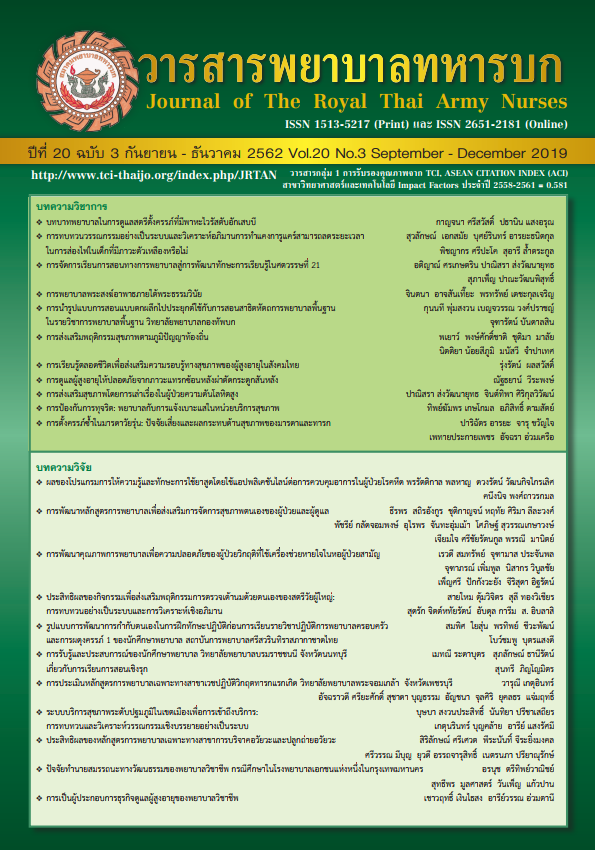Perceptions and Experiences of Nursing Students in Boromarajonani College of Nursing Changwat Nonthaburi regarding Active Learning
Keywords:
perception, experience, nursing students, active learningAbstract
This research was phenomenologically designed. The objective was to study nursing students’ perceptions and experiences regarding active learning. Semi-structured interviews were conducted with 15 first-year nursing students studying in Boromarajonani College of Nursing, Changwat Nonthaburi, Academic Year 2018. Purposive sampling was used to select the participants. Data were analyzed following principles of Giorgi’s phenomenological method.
The results of the study found that four core themes related to active learning emerged. There were: 1. active learning’ experience including 4 subthemes addressed passion of learning; teamwork; critical thinking; and participation between students and instructors, 2. Perceptions toward active learning method consisting of 3 subthemes addressed game-based learning; debated; and project-based learning, 3. benefits of active learning containing 4 subthemes included developing of critical thinking; increasing self-confidence; acknowledge of teamwork ;and inspiring of leaning, 4. barriers of active learning including 2 subthemes consisted of imbalance of workpiece with time; and instructors problems. The results of the research suggested that the nursing college promote active learning in several courses where learning activities were applied based on the agreement of the number of such activities and their corresponding required periods of time.
Downloads
References
2. Turner K, Petkong J, Howharn C, Mamark N. Teach Less, Learn More: A Conceptual Model and Application for Nursing Education Nursing. Journal of the Ministry of Public Health. 2016;26(3): 13-26. (In Thai)
3. Abao E, Dayagbil F, Boholano H. Engagement to Social Networking: Challenges and Opportunities to Educators. European Scientific Journal. 2015; 11(16): 173-191.
4. Sinlarat P. CCPR new educational framework. Bangkok: Chulalongkorn University. 2011. (In Thai).
5. Bellanca J. and Brandt, R., Editors. 21st Century Skills: Rethinking How Students Learn. Bloomington. Solution Tree Press. 2010.
6. Onsri P. An Instructional Model for Enhancing 21st -Century Learning Skills among Army Nursing Students. Journal of The Royal Thai Army Nurses. 2018; 19(3): 147-157. (In Thai)
7. Pruthikul S. Quality of students derived from active learning process. Journal of Educational Administration Burapa University. 2015; 6(2): 1-13. (In Thai)
8. Prontadavit N. Development of Active Learning in Learning Management Subject. Rajamangala University of Technology Krungtep Research Journal. 2017; 11(1): 85-94. (In Thai)
9. Sanguansai K. Active Learning management Process. PBL WU Newsletter. 2011; 4(2): 4-6. (In Thai).
10. Ngambunjong S. Development of a Learning Process management Model to Strengthen the 21st Century Skills through-“Moderate Class More Knowledge”-Activity: Office of the Basic Education Commission. Bangkok. Office of the Basic Education Commission. Ministry of Education. 2016. (In Thai.)
11. Kolb DA. Experiential learning: Experience as the source of learning and development. Englewood Cliffs, NJ. Prentice Hall. 1984.
12. Holloway I, Wheeler S. Qualitative research in nursing and healthcare. 3rd ed. Oxford: Blackwell; 2010.
13. Giorgi, A. Phenomenology and psychological research. Pittsburgh, Pennsylvania: Duquesne University Press; 1985.
14. Denzin NK., Lincoln YS. The SAGE handbook of qualitative research. California: Sage; 2011.
15. Poonperm R, Proygern J, Sunuanta S, Prompeng N. Effectiveness of Question Based learning of Nursing students at the Royal Thai Army Nursing College. Journal of The Royal Thai Army Nurses. 2018; 19(3): 147-157. (In Thai)
16. Huda SU, Saeed Ali T, Nanji K, Cassum S. Perceptions of Undergraduate Nursing Students Regarding Active Learning Strategies, and Benefits of Active Learning. International Journal of Nursing Education. 2019; 8(4):193–9.
17. European University Association (EUA). Promoting Active Learning in Universities: Thematic Peer Group Report. Learning & Teaching Paper #5. Belgium: European University Association.2019.
18. Prontadavit N. Learning management: Active Learning. Bangkok: Tripple Education. 2016. (In Thai)
19. Downs CT, Wilson AL. Shifting to Active Learning: Assessment of a First-Year Biology Course in South Africa. International Journal of Teaching and Learning in Higher Education. 2015; 27(2): 261–274.
20. Prajankett O, Indhraratana A, Prasittivejchakul A, Pornnapa K, Kaoaiem H. The effect of Cooperative Learning Using Jigsaw on Community Health Nursing Process Toward 21st Century Learning Skills and Community Health Nursing Competency of Nursing Students. Journal of The Royal Thai Army
Nurses. 2018; 19(3): 147-157. (In Thai)
21. Shahnaz SMF, Hussain RMR. Designing Instruction for Active and Reflective Learners in the Flipped Classroom. Malaysian Journal of Learning and Instruction. 2016; 13(2): 147–173.
22. Kim AM, Speed CJ, Macaulay JO. Barriers and Strategies: Implementing Active Learning in Biomedical Science Lectures. Biochemistry and Molecular Biology Education. 2019; 47(1):29–40.
23. Tseng SS, Yeh HC. Fostering EFL Teachers’ CALL Competencies through Project-Based Learning. Educational Technology & Society. 2019; 22(1): 94–105.
Downloads
Published
How to Cite
Issue
Section
License
บทความหรือข้อคิดเห็นใดใดที่ปรากฏในวารสารพยาบาลทหารบกเป็นวรรณกรรมของผู้เขียน ซึ่งบรรณาธิการหรือสมาคมพยาบาลทหารบก ไม่จำเป็นต้องเห็นด้วย
บทความที่ได้รับการตีพิมพ์เป็นลิขสิทธิ์ของวารสารพยาบาลทหารบก
The ideas and opinions expressed in the Journal of The Royal Thai Army Nurses are those of the authors and not necessarily those
of the editor or Royal Thai Army Nurses Association.






